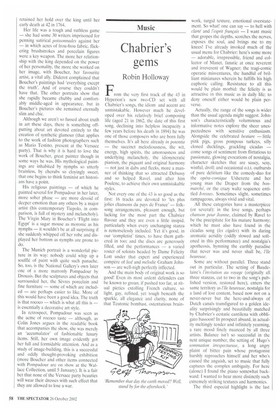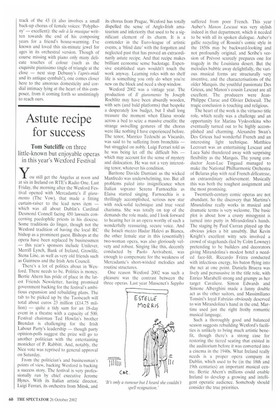Music
Chabrier's gems
Robin Holloway
From the very first track of the 43 in Hyperion's new two-CD set with all songs, the idiom Chabrier's so and accent are bl unmistakae. However much he developed over his relatively brief composing life (aged 21 in 1862, the date of this first song, declining into helpless incapacity a few years before his death in 1894) he was one of those composers who are born fully themselves. It's all here already in potentia — the succinct melodiousness, the wit, energy, high spirits, the amorousness and underlying melancholy, the idiosyncratic pianism, the piquant and original harmony — not just in dabs and flecks, more a manner of thinking that so attracted Debussy and so helped Ravel, and after him Poulenc, to achieve their own unmistakable styles. Not every one of the 43 is so good as the first: 16 tracks are devoted to `les plus jolies chansons du pays de France' — folksong arrangements, pleasant enough, but lacking for the most part the Chabrier flavour and they are even a little insipid, particularly when every unchanging stanza is remorselessly included. Yet it's good, in our `completisf times. to have them gathered in too; and the discs are generously filled. and the performances — a varied roster of soloists headed by Dame Felicity Lott under that expert and experienced compere of lied and melodie Graham Johnson — are well-nigh perfectly inflected. And the main body of original work is so good! Even its most ardent defenders can be known to groan, if pushed too far, at ritual pieties extolling French culture. so light, gay, refined, yet tough beneath the sparkle, all elegance and clarity, none of that Teutonic bombast. ostentatious brain work, turgid texture, emotional overstatement. So what! one can say — to hell with clarte and l'esprit francais — I want music that gropes the depths, scorches the nerves, exposes the soul, and brings me to my knees! I've already invoked much of the usual menu for Chabrier: here's some more — adorable, irrepressible, friend and collector of Manet, fanatic at once reverent and irreverent of Wagner; the tragi-comic operatic misventures, the handful of brilliant miniatures wherein he fulfills his high euphoric calling. Resistance to all this would be plain morbid: the felicity is as attractive in this music as in daily life: to deny oneself either would be plain perverse. Actually, the range of the songs is wider than the usual agenda might suggest. Johnson's characteristically voluminous and informative notes explore the sheer unexpectedness with sensitive enthusiasm. Alongside the celebrated bestiare — little pink pigs, gross pompous turkeys, silly cloned ducklings, grackling cicadas — come songs of sentiment from flirtatious to passionate, glowing evocations of nostalgia, character sketches that are saucy, sexy, wistful, droll; and occasional o.t.t. outbursts of pure delirium like the comedy-duo for the opera-comique Usherette and her young man the Draper from the bonmarche, or the crazy waltz sequence entitled Ivresses. Sometimes slight, sometimes rampageous, always vivid and vital. All these categories have a masterpiece (or several): in the love songs, perhaps chanson pour Jeanne, claimed by Ravel to be the precipitate for his mature harmony; which he must also have found in the cicadas song (les cigales) with its daring aromatic acridity (oddly slowed and softened in this performance) and nostalgia's apotheosis, hymning the earthly paradise that never was and never shall be, rile heu reuse. Some are without parallel. Three stand out in particular. The setting of Baudelaire's l'invitation au voyage (originally all three stanzas, cut to two in the song's published version, restored here), enters the same territory as rile heureuse, nostalgia for a land of lost content, based now not on a never-never but the here-and-always of Dutch canals transfigured to a golden ideality surprisingly and beautifully matched by Chabrier's ecstatic cantilena with obbligato bassoon! In prospect absurd. in actuality meltingly tender and infinitely yearning, a rare mood finely nuanced by all three artists. Balance isn't so successful in the next unique number, the setting of Hugo's sommation irrespectueuse, a long angry plaint of bitter pain whose protagonist harshly reproaches himself and her who's caused the anguish, set to music that fully captures the complex ambiguity. For here (alone) I found the piano somewhat backward: I wanted to hear more distinctly such extremely striking textures and harmonies. The third especial highlight is the last track of the 43 (it also involves a small back-up chorus of female voices: 'Polyphony' — excellent): the ode a la musique written towards the end of his composing years for a friend's house-warming. I've known and loved this six-minute jewel for ages in its orchestral version. Though of course missing with piano only many delicate touches of colour (such as the exquisite pianissimo tingle of triangle at the close — next stop Debussy's l'apres-midi and its antique cymbals!), one comes closer here to the amorous domesticity and cordial intimacy lying at the heart of this composer, from it coming forth so unstintingly to reach ours.



















































































 Previous page
Previous page